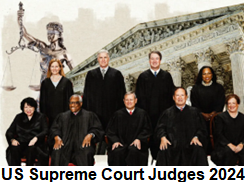- Four Supreme Court Cases That Could Curb the Administrative State.
- Supreme Court Rulings Curb Executive Power. Decision in Loper Bright upended decades of precedent while both cases raised questions about the separation of powers.
- Rules in favor of Jan. 6 Defendant Who Challenged Obstruction Charge.
| It’s unclear how Congress will be impacted but the decisions could force legislators to be more specific in their language when authorizing regulation. |
Washington DC, June 28.– The Supreme Court released major decisions yesterday that upended the decades-old Chevron deference doctrine and narrowed the way courts could apply a financial reform law the Biden administration used to prosecute Jan. 6 defendants. In doing so, the justices raised questions about the Justice Department’s response to Jan. 6 and the future of administrative power. 
Another case, City of Grants Pass v. Johnson, saw the 6-3 conservative majority holding that a city law against public camping didn’t violate the constitution’s prohibition on cruel and unusual punishment. A dissent authored by Justice Sonia Sotomayor accused the city of punishing people for their status as homeless—something she described as “unconscionable and unconstitutional.”
Those were just some of the hotly anticipated cases for the 2023-2024 term, which has been extended for one day in July. A handful of decisions are expected that day on former President Donald Trump’s immunity appeal in his Washington trial, laws in Texas and Florida regulating social media giants, and another concerning the statute of limitations for challenging regulation. ![]()
By overruling Chevron, the justices removed deference typically afforded to agency interpretations of ambiguous statutes passed by Congress. Under the court’s new precedent, judges will need to interpret statutes as they usually do rather than applying a two-step test that was employed under Chevron.
A 6-3 conservative majority on the court overruled the doctrine while the court’s three liberals dissented as they had in another recent administrative case, SEC v. Jarkesy ...
[ Full text ]
Comments powered by CComment